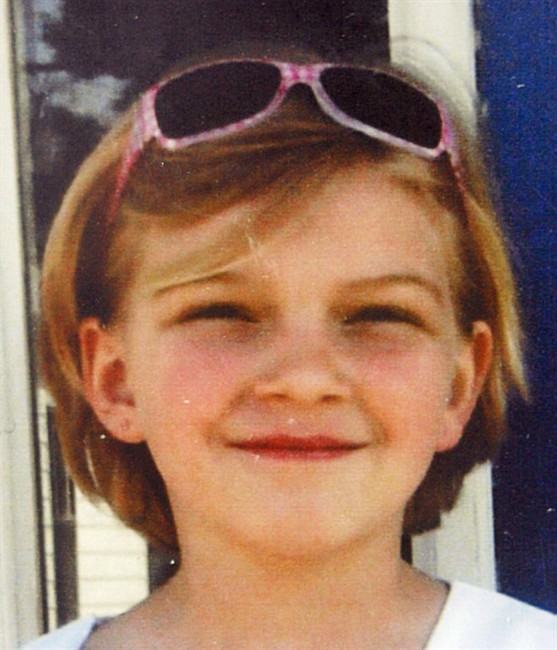TORONTO – The case of a woman who claims she should be recognized as a victim of crime because she developed post-traumatic stress disorder after serving as a juror in a horrific murder trial goes before Ontario’s top court on Tuesday.

The woman, who cannot be identified, was a juror in the trial of Michael Rafferty, who was convicted in 2012 of kidnapping, sexually assaulting and murdering eight-year-old Victoria (Tori) Stafford, of Woodstock, Ont.
The 57-year-old argues that she suffered psychological injury as a result of coming “face to face” with Rafferty’s horrific crimes and is seeking compensation as a victim of crime.
WATCH: Tori Stafford juror seeks compensation for PTSD after murder trial (Oct. 20)
She first sought compensation from the Criminal Injuries Compensation Board – a tribunal that assesses financial compensation for victims and family of deceased victims of violent crimes in Ontario – but her application was dismissed. She then appealed to the Divisional Court, which also dismissed her case.
She then turned to the Court of Appeal for Ontario.
“This is a test case,” the woman’s lawyers argue in documents submitted to the court. “It examines what it means to be a victim as defined by the Compensation for Victims of Crime Act, and whether that definition may include a juror in a criminal trial who suffers PTSD as a result of her participation in that trial.”
- Man accused of killing girlfriend, her father in Halifax was wanted in Toronto shooting
- RCMP seize millions of dollars worth of equipment from alleged chop shop in Alberta
- Woman, her father fatally shot by man in intimate partner violence attack: Halifax police
- Shooting outside New York City nightclub leaves 10 wounded
READ MORE: Court says alleged trial errors raised by killer of Tori Stafford never happened
The woman’s lawyers argue that unlike those who choose to work in the criminal justice system, jurors are “effectively ordered” to participate in it and have evidence of violent crime “imposed upon them.”

Get daily National news
“As a juror (the woman) was brought face to face with Mr. Rafferty’s crimes of abducting, raping, desecrating and murdering eight-year-old Tori Stafford,” her lawyers argue. “As a result, (the woman) claims she suffered an injury of nervous shock, now more commonly known as post-traumatic stress disorder. (The woman) continues to suffer a psychological injury and to struggle emotionally and financially.”
But the Criminal Injuries Compensation Board argues the woman was not a victim under the Compensation for Victims of Crime Act and found she did not meet all legal criteria for a claim of mental or nervous shock, according to documents it submitted to the Appeal Court.
READ MORE: Michael Rafferty’s appeal in Tori Stafford murder dismissed
The board argued the woman’s interpretation of “victim” under the act would allow for “an indefinite expansion” of those who may claim compensation as victims, potentially including court staff, lawyers and individuals that watch news that depict a crime of violence, the documents said.
“The CICB also concluded it was absurd to suggest that a jury member was a ‘victim of crime,”‘ the documents said. “It was the hearing of evidence about a crime at a criminal trial that caused her emotional distress, not a crime itself.”
The board is asking that the appeal be dismissed or, if it’s allowed, that the matter be sent back to the board for a new hearing.
READ MORE: ‘It’s hard:’ 5 years later, Tori Stafford’s dad still haunted by her death
The juror – a mother of two – alleges that immediately after the trial she began to experience “significant impairments” in concentration and short-term memory, depression, anxiety – particularly about the safety of her children – and had vivid flashbacks of evidence from the trial, her lawyers argue.
The woman took time off work and went on long-term disability and claimed she was formally diagnosed with PTSD and anxiety disorder, they said.
“Medical professionals have concluded that being exposed to the crimes of Mr. Rafferty caused (the woman’s) condition,” her lawyers argued.
READ MORE: Court rules Tori Stafford’s killer’s appeal should be funded by the public
They further argued that the Criminal Injuries Compensation Board and the Division Court didn’t correctly assess if the woman was considered a victim of crime.
The woman is asking the Appeal Court to set aside the earlier dismissals of her case, issue an order that she sustained a serious psychological injury from her participation in Rafferty’s trial as a juror, and direct the Criminal Injuries Compensation Board to assess the compensation to which she claims she is entitled.
A lawyer for the attorney general for Ontario, which was granted intervenor status in the case, argues that the Compensation for Victims of Crime Act is not the vehicle which can provide the compensation sought by the juror.
READ MORE: Timeline: Victoria ‘Tori’ Stafford murder
“The legislation provides compensation to individuals who have been directly harmed by a criminal act. The CVCA does not insure the public generally against other negative impacts of crime,” the lawyer argued in documents submitted to the Appeal Court.
Providing compensation to jurors is an issue that requires policy analysis and a “clear understanding” of the implications of such a decision, the documents said.
On Monday, Ontario Attorney General Yasir Naqvi announced that by January next year, the provincial government would be offering free counselling to all jurors who want it.
“We want to ensure that anyone serving as a juror in Ontario has the supports they need,” Naqvi said in a statement. “Jurors will be able to call a designated phone number and get help whenever they need it.”







Comments